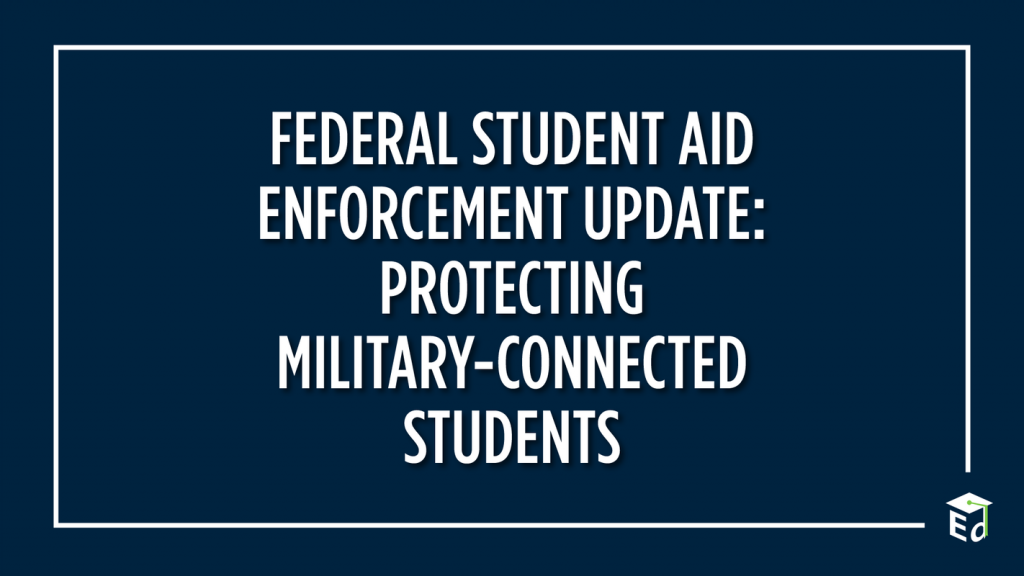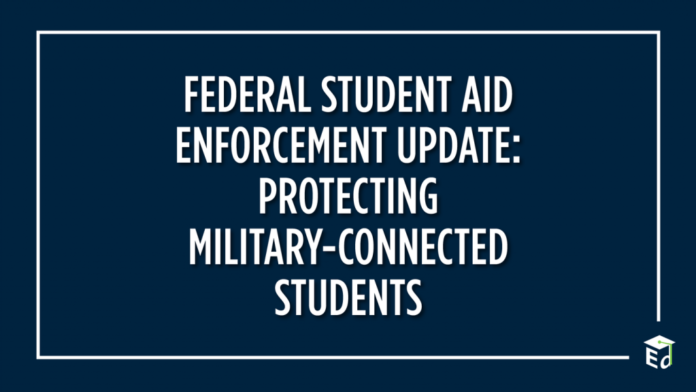
By: Kristen Donoghue, Chief Enforcement Officer, U.S. Department of Education’s office of Federal Student Aid
The U.S. government helps service members, veterans, and their family members (i.e., military-connected students) achieve the American dream through higher education, especially with two important benefit programs: (1) the Military Tuition Assistance (TA) program, which supports course work for active duty, National Guard, and Reserve Component service members; and (2) the GI Bill®, which supports post-service course work. These benefits can cover up to 100% of tuition and a living stipend at approximately 5,600 American colleges, universities, and career schools, giving those who served and their families the opportunity to build a better future through education.
Unfortunately, unscrupulous schools may be using aggressive and misleading recruiting practices to take advantage of service members, veterans, and military-connected students and the programs designed to benefit them. The U.S. Department of Education (Department) is monitoring complaints and borrower defense to repayment applications reporting that service members, veterans, and military-connected students have been misled, pressured, and/or coerced by school recruiters and admissions staff. Some students reported being told that their military benefits would cover all of the costs of a degree, only to learn later that they would have to take out loans or pay out-of-pocket to finish their program. Others reported that they were pressured to start classes before their military benefits were verified or encouraged to enroll in programs that they later learned were not approved for military benefits. Some students even reported that student loans were taken out in their names without their knowledge.
Today, we are warning schools that participate in the federal student aid programs that the kind of conduct mentioned above would violate the Department’s regulations, including the prohibition against substantial misrepresentations. Consequences for schools that violate these prohibitions could include the termination or limitation of a school’s participation in the Department’s federal student aid programs. In addition, borrowers subject to such misrepresentations or fraud could be entitled to a discharge of their student loans, and the offending schools could be liable to repay those funds.
The Department recently reestablished the Office of Enforcement in Federal Student Aid (FSA) to help protect students and borrowers from wrongdoing by schools. The Department takes seriously our obligation to protect the investment of all students seeking to achieve the American dream through education, especially for students and borrowers who have served in the U.S. armed forces. The Department will vigilantly monitor schools for misrepresentations and similar practices. If we determine that a school has misrepresented costs or financing to military-connected students or has taken out loans in a prospective student’s name without that student’s knowledge, we will pursue such violations to the greatest extent of our authority and seek all appropriate corrective measures.
The Department is also committed to working with our state and federal enforcement partners, as we have highlighted before. In this case, we have shared information and complaints about military-connected students with relevant partners, including the U.S. Departments of Defense and Veterans Affairs, for potential agency action.
FSA’s Office of Enforcement can do its job best when knowledgeable sources share information about potential violations by the institutions we oversee. Students and borrowers who have experienced the conduct described above or who wish to report any other issues related to their student aid or their schools may submit a complaint to the Department at StudentAid.gov/feedback-center. Current or former employees of schools overseen by the Department may submit a report of suspected wrongdoing through the Office of the Inspector General (OIG) Hotline. The OIG Hotline may be reached confidentially at oighotline.ed.gov, by fax at 202-245-7047, or by mail at the following address: U.S. Department of Education, Inspector General Hotline, 400 Maryland Avenue, SW, 8th Floor-PCP, Washington, DC 20202-1500.
FSA and the Department will work hard to ensure that veterans and service members—who devote their lives to protecting our nation—have a strong advocate within the Department to address and deter unscrupulous practices by schools seeking to harm them.






